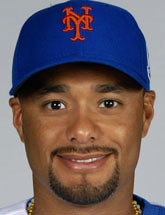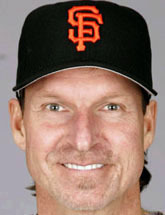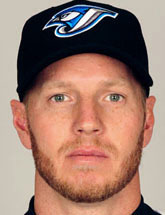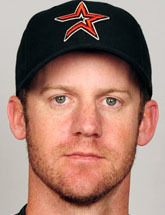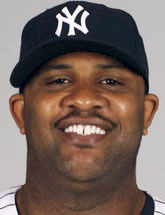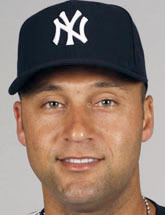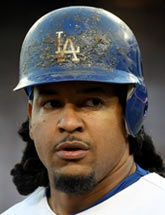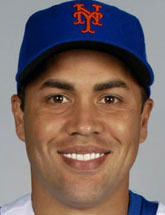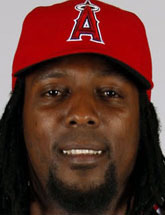5. Bobby
 Cox - Atlanta ('00-'09) 6x N.L. East Champs - N.L. Manager of the Year in '04, '05 - Record: 892-727 (.550)
Cox - Atlanta ('00-'09) 6x N.L. East Champs - N.L. Manager of the Year in '04, '05 - Record: 892-727 (.550)Sure, the '90s were really the Braves' decade, only one Atlanta team made it past the NLDS in the last 10 years ('01), and the run of 14 straight division titles ending after '05 with the Braves rising no higher than 3rd place since. But six of those 14 division titles came during this decade when Cox and GM John Schuerholz were still outclassing so much of the National League. Cox still represents the old school, a no-nonsense guy who manages to command both respect and love from younger players and veterans alike. Is it any wonder why guys like Chipper Jones and John Smoltz stayed with Atlanta for so long? They loved Cox, and Smoltz only left because the front office pushed him aside. Part of that love comes from his willingness to stand up for his players. In '07 he passed John McGraw for first in all-time ejections, and unlike McGraw, Cox isn't a jerk. At the very least, Cox has always been entertaining, but players have fed off that intensity for 28 years. Sitting fourth all-time in managerial wins, Cox turns 70 next year and has pledged that '10 will be his last season. It won't be just Braves fans that will miss him.
 4. Mike Scioscia - L.A. Angels ('00-'09) '02 World Series Champ, 5x A.L. West Champ, 1x A.L. Wild Card Champ - A.L. Manager of the Year in '02, '09 - Record: 900-720 (.556)
4. Mike Scioscia - L.A. Angels ('00-'09) '02 World Series Champ, 5x A.L. West Champ, 1x A.L. Wild Card Champ - A.L. Manager of the Year in '02, '09 - Record: 900-720 (.556)The Angels spent the last few years of the '90s mired in Terry Collins-led mediocrity but the franchise turned over a new leaf with Scioscia, the former All-Star Dodgers catcher, at the dawn of a new decade. In two rebuilding seasons Scioscia completely reinvented the Angels from also-rans into a perennial A.L. force. Behind the awesome power of the Rally Monkey, the Angels rallied their way to the World Series title in '02, and Scoiscia has taken them back to the playoffs five more times since with a rotating cast of players. GMs Bill Stoneham and Tony Reagins have constantly tried to supply Scioscia with the type of players he craves: versatile, fundamentally-sound ones who can grind out 2-1 and 3-2 victories, with the occasional power presence like Vlad Guerrero and Mark Teixeira thrown in. It's always been said that Scioscia prefers a N.L.-style team, but the truth is Scioscia just wants players that know how to win. More often than not, they have. Considering Scioscia is signed through 2018, the Angels are in his sure hands for years to come.
 3. Tony La Russa - St. Louis ('00-'09) '06 World Series Champ, '04 N.L. Champ, 6x N.L. Central Champ, 1x N.L. Wild Card Champ - N.L. Manager of the Year in '02 - Record: 913-706 (.564)
3. Tony La Russa - St. Louis ('00-'09) '06 World Series Champ, '04 N.L. Champ, 6x N.L. Central Champ, 1x N.L. Wild Card Champ - N.L. Manager of the Year in '02 - Record: 913-706 (.564)When La Russa took an 83-win Cardinals team to a World Series title in '06, it was perhaps the greatest accomplishment in a career littered with milestones. Just ahead of Cox on the all-time wins list, La Russa won his second World Series 15 years after his first, and joined Sparky Anderson as the only managers to win a ring in both leagues. La Russa's enjoyed so much consistent success despite all kinds of changes to the Cardinals roster. Of course, having someone as good as Albert Pujols makes any manager look good. But the hallmark of St. Louis during the La Russa era has been pitching, and much of the credit goes to pitching coach Dave Duncan, who's worked with La Russa since 1983. From the late Darryl Kile through Adam Wainwright, the seven Cardinals playoff teams were driven by pitching and La Russa's creative bullpen configurations. He's not always easy to get along with (just ask Scott Rolen), but any player knows they'll win under La Russa's leadership.
 2. Terry Francona - Philadelphia ('00), Boston ('04-'09) '04 and '07 World Series Champs, 4x Wild Card Champ, 1x A.L. East Champ - Record w/Philadelphia: 65-97 (.440), w/Boston: 565-407 (.581)
2. Terry Francona - Philadelphia ('00), Boston ('04-'09) '04 and '07 World Series Champs, 4x Wild Card Champ, 1x A.L. East Champ - Record w/Philadelphia: 65-97 (.440), w/Boston: 565-407 (.581)Not unlike his New England coaching counterpart Bill Belichick, Francona needed to fail before he could succeed. Tito never won more than 77 games in four Philadelphia seasons and was run out of town on a rail in '00. Then came a year in the Cleveland front office, and a year each coaching in Texas and Oakland. Theo Epstein gave Grady Little the heave-ho after '03, and Francona blew the Boston brass away with his interview. Here was a forward-thinking baseball man respected throughout the industry that just needed a chance to succeed. To say Tito's "succeeded" is an understatement. Besides '06, when a talented team was decimated by injuries, the Red Sox earned a playoff spot every season of Francona's tenure. When the chips were down against the Yankees in '04, and when things looked grim against the Indians in '07, he didn't allow his players to give up. He was rewarded both times with eventual World Series sweeps, making him the only manager to win multiple titles in the Aughts. Could I have imagined the Red Sox would have this kind of success when Francona was hired? Probably not. But he's become the best manager in franchise history due to his perfect mix of attributes (calmness, intellect, astute and clear handling of the media, warmth and dedication toward his players) at a time when the front office gave him the game's best talent. A lesser man certainly could have screwed all that up. But not Terry Francona. I hope he manages this team until the day he dies.
 1. Joe Torre - N.Y. Yankees ('00-'07), L.A. Dodgers ('08-'09) '00 World Series Champs, '01 & '03 A.L. Champ, 7x A.L. East Champ, 1x A.L. Wild Card Champ, 2x N.L. West Champ - Record w/New York: 773-519 (.598), w/Los Angeles: 179-145 (.552)
1. Joe Torre - N.Y. Yankees ('00-'07), L.A. Dodgers ('08-'09) '00 World Series Champs, '01 & '03 A.L. Champ, 7x A.L. East Champ, 1x A.L. Wild Card Champ, 2x N.L. West Champ - Record w/New York: 773-519 (.598), w/Los Angeles: 179-145 (.552)The no. 1 manager of the Aughts was also the no. 1 reason why, as a Red Sox fan, it was always so hard to hate the Yankees this decade and most of the last. The Yankees were so often a likable, professional, classy bunch and it began with the most likable, professional, and classy of them all in Joe Torre. Always so grateful in victory, always so graceful in defeat. He was seldom confrontational with anyone, and never looked to start problems. Torre just wanted to win, and do it the right way, and win he did. Teams managed by Torre have made the postseason every year starting in '96, a mind-boggling reality only matched by Cox's 14 straight division titles. Like Francona, he's been blessed with amazing teams. But in the pressure-cookers of New York and Los Angeles, Torre has consistently managed personalities at Phil Jackson-level while commanding respect and an adherence to winning, team-oriented attitudes. It's a testament to his longevity and an undying love for the game. Never a fantastic manager before coming to New York, he survived the wrath of George Steinbrenner longer than anyone, which is no small feat. In L.A. he's presided over a wonderful mix of veterans and youngsters, not to mention Mannywood. With the franchise in turmoil, no one knows how much longer Torre will be around. L.A. is probably his last stop, and he'll deserve every ounce of praise when he retires. He's become the best manager of my lifetime, without a doubt.
Before I get to the teams of the decade, you will notice none of them are N.L. teams. I've railed against the N.L. many times on this blog, but know that A.L. teams won six of the last 10 championships and none of the N.L. teams won more than 92 regular season games. Had the 105-win '04 Cardinals not run into the Red Sox they certainly would be here, and the '07 comeback Rockies were close. I tried to combine regular season and postseason factors here, and the five best A.L. teams were better than any N.L. club. On to the list:

5. 2002 Anaheim Angels - regular season: 99-63, A.L. Wild Card Champs by 6 games - ALDS: 3-1 over NYY - ALCS: 4-1 over MIN - WS: 4-3 over SFG (11-5 postseason record)
Sometimes all you need are some new uniforms, a new manager and some faith. As I mentioned above, Mike Scioscia was in his third season reforming the Angels when all the sudden they were a force to be reckoned with in the A.L. Vets like Garret Anderson, Darin Erstad and lifelong Angel Tim Salmon shined for this club while 25-year-old Troy Glaus provided all the pop they needed. In the rotation, Ramon "Mini-Pedro" Ortiz, Jarrod Washburn and Kevin Appier earned sub-4 ERAs. On June 24, a 23-year-old from Abilene, Texas named John Lackey made his Major League debut and carried the Angels the remainder of the season, going 9-4 with a 3.66 ERA. At the back end was Troy Percival, the fearsome, herky-jerky closer with a 1.92 ERA and 40 saves during the regular season. This was a fun bunch, personified by grinders like Erstad, David Eckstein and Adam Kennedy. Fans came to games armed with those annoying ThunderStix and went wild with every Rally Monkey appearance on the scoreboard. The team rolled through the A.L. playoffs, and a 20-year-old bespectacled Francisco Rodriguez came out of nowhere to dominate hitters with that ungodly curveball. Only Barry Bonds and the Giants stood in their way, and an epic series ensued. Three of the first four games were decided by one run before San Fran issued a 16-4 beatdown in Game 5, and all seemed lost with the Giants up by five late in Game 6. But the power of the Rally Monkey prevailed, the Halos scored six unanswered runs and captured the first World Series title in franchise history the next night. Glaus took home MVP honors by clubbing three homers with a 1.313 OPS in the series, while Lackey became the first rookie starter to win a World Series Game 7 in 93 years. Thus began the decade of success for the Angels, but they haven't reached the heights of '02 since.
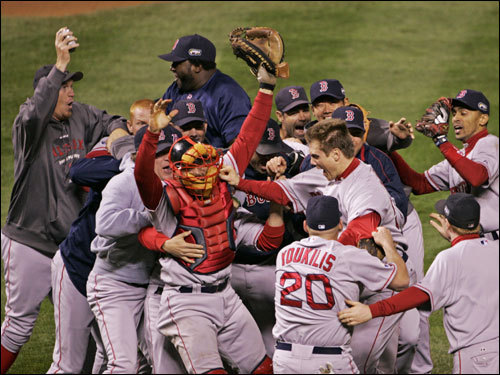
4. 2007 Boston Red Sox - regular season: 96-66, A.L. East Champs by 2 games - ALDS: 3-0 over LAA - ALCS: 4-3 over CLE - WS: 4-0 over COL (11-3 playoff record)
This wasn't the same team that won it all in '04, not by a long shot. During the course of '05 and '06, Theo Epstein jettisoned many aging members of the '04 squad and infused the Red Sox with young draftees and hungry veterans from both sides of the Pacific. The '06 season ended in a bitter malaise of injuries, so armed with new blood like Daisuke Matsuzaka, J.D. Drew, Hideki Okajima and Julio Lugo, the Red Sox set out for something better. Dustin Pedroia struggled so much those first two months, but Francona stuck with him, and he wound up Rookie of the Year. Mike Lowell experienced a career renaissance, batting .324 and playing sterling defense at third base as the true team MVP of the Sox that year. Coming off a 54-dinger season, David Ortiz had to settle for 35 with a 1.066 OPS while still at the zenith of his hitting prowess. Josh Beckett bounced back from inconsistency in '06 to blow away everyone in his path in '07, evolving into a true ace with 20 victories, a 3.27 ERA and 194 strikeouts in 200 innings while anchoring a staff with a league-best 3.87 ERA. Jonathan Papelbon allowed just 12 earned runs all season and secured his spot as the game's best closer. In the playoffs the Red Sox found themselves in familiar territory, down 3-1 in the ALCS to the Indians. But Beckett lifted them up in Game 5, and Drew, who'd experienced a terrible first season in Boston both professionally and personally, crushed that grand slam early in Game 6 off Fausto Carmona. They feasted on the bad Cleveland bullpen in Game 7, and then swept the Rockies for the crown. It was never easy with the '07 Sox, as so many players battled injuries, ineffectiveness and expectations, but they stood tall once again. The best moment came when Jon Lester, who'd been diagnosed with lymphoma just a year before, pitched the Red Sox to victory in the clinching Series game.

3. 2009 New York Yankees - regular season: 103-59, A.L. East Champs by 8 games - ALDS: 3-0 over MIN - ALCS: 4-2 over LAA - WS: 4-2 over PHI (11-4 playoff record)
So far, each team on this list had to overcome some type of disappointment the previous season to prevail with a World Series title. For the Yankees, '08 was Joe Girardi's first year at the helm and an older Yankees squad experienced their fair share of injuries, missing the playoffs for the first time since the strike. In an winter of down contracts, GM Brian Cashman spent like a drunken sailor, but spent it on all the right guys for a change, bringing in CC Sabathia (19-8, 3.37 ERA in 230 innings), A.J. Burnett (13-9, 4.04 ERA in 207 innings) and Mark Teixeira (39 HR, 122 RBI, .948 OPS). The '09 season was far from a cakewalk for the Yankees; they stumbled out of the gate, Alex Rodriguez dealt with drama after drama, they lacked a fifth starter for the entire season and strong options in front of Mariano Rivera until Phil Hughes was converted to a full-time reliever. But they hit their stride in the summer, and a new, hitter-friendly park spurred an offense that ranked first in the A.L. in hits, runs, homers, OBP and OPS. Girardi employed a three-man rotation in the playoffs that somehow worked despite facing the Phillies and Angels, the second- and third-best teams of '09. Late in World Series Game 4, when it appeared the Phillies would rally to tie the series, Johnny Damon stole second off Brad Lidge and then stole third when he noticed no one was covering the base in the over-shifted infield. Lidge imploded, the Yankees prevailed, then took the title in six games. Unlike every Yankees team since '01, this was an amusing, loose group that captivated fans far outside the Bronx. Hell, even A-Rod finally had a good time, and it showed with his clutch playoff performance. Despite some deficiencies in pitching and a manger who often looked overmatched, this was the finest Yankees team since their '98 juggernaut. With that said, I will now take a kerosene bath and bring my Zippo with me.

2. 2005 Chicago White Sox - regular season: 99-63, A.L. Central Champs by 6 games - ALDS: 3-0 over BOS - ALCS: 4-1 over LAA - WS: 4-0 over HOU (11-1 postseason record)
The baseball gods were smiling upon long-downtrodden teams in the middle of this decade. The Red Sox won their first World Series in 86 years in '04, and a year later, the White Sox and their fans were blessed with a championship club for the first time since 1917. They'd sucked for most of their history, yet for the entirety of the '05 season these South Side warriors were the team to beat, and few could. Fiery Ozzie Guillen was in his sophomore season as White Sox manager and while his ubiquitous personality made waves off the field, the players did most of their talking on it. Paul Konerko hit 40 homers and Jermaine Dye 31, while leadoff man Scott Podsednik swiped 59 bags. Podsednik and center fielder Aaron Rowand tracked down each fly ball with reckless abandon for an excellent defensive group. While they may have represented the end of an era for great MLB teams on the offensive side (they were just 11th in the A.L. in team OBP at .322, adopting what Guillen called a "smart ball" approach), their pitching was undeniably awesome. Their top four starters (Mark Buehrle, Freddy Garcia, Jon Garland and Jose Contreras) all made either 32 or 33 stars, all had ERAs under 4, and only Contreras exceeded 60 walks. Longtime starter Dustin Hermanson was converted to closer, notching 34 saves with a 2.04 ERA before injuring his back in September and losing his job to 24-year-old flamethrower Bobby Jenks. The staff dominated October, most impressively in the ALCS. Outside of 2/3 innings by Neal Cotts to finish the Game 1 loss to the Angels (the team's only postseason defeat), the four aforementioned starters pitched the entirety of the series, all four victories coming on complete games. In the Series against Houston, Podsednik blasted the Game 2 walkoff (he hit no homers during the season), Geoff Blum provided the heroics in the epic 14-inning Game 3, and in perfect '05 White Sox fashion, Juan Uribe made a fantastic play up the middle to finish off the sweep in Game 4. Cubs fans everywhere are still shaking their heads.
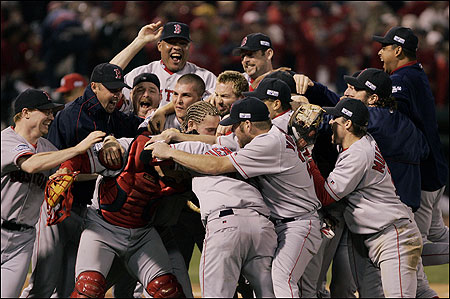
1. 2004 Boston Red Sox - regular season: 98-64, A.L. Wild Card Champs by six games - ALDS: 3-0 over ANA - ALCS: 4-3 over NYY - WS: 4-0 over STL (11-3 postseason record)
Hard to believe it's been five years, huh? Of the 25 members of the '04 World Series roster, only Ortiz, Tim Wakefield and Jason Varitek remain in Boston, and by '11 even they'll probably be gone. But, no matter how much they may have angered Red Sox fans after the fact, all 25 were part of the most amazing sports story of my lifetime, an iconic piece of American history and the greatest baseball team of the last 10 years. That story begins in October '03, when Grady left Pedro in too long and Aaron Bleepin' Boone took the Yankees to the World Series, leading to another winter of discontent. Theo Epstein got to work, spent Thanksgiving with the Schillings and returned home with his ace. The '03 Sox lacked a closer, so in came Keith Foulke, who'd wind up tossing a whopping 83 regular season innings with a 2.17 ERA. Alex Rodriguez nearly hopped aboard, but went to New York instead. Nonetheless, Boston was an offensive powerhouse, leading the A.L. in runs, average, OBP and OPS, with Ortiz and Manny Ramirez each topping 40 HR and 130 RBI. The starting pitching quintet of Schilling, Martinez, Wakefield, Derek Lowe and Bronson Arroyo started all but five games in both the regular season and the playoffs. Just reaching the playoffs was a concern for much of the season's first half. We all remember the Vartiek-Rodriguez brawl, but the sea change came a week later when Epstein bravely dealt franchise hero Nomar Garciaparra for veterans Orlando Cabrera, Doug Mientkiewicz and Dave Roberts. Sitting at 56-47 on August 1, the revamped Red Sox went 42-18 the rest of the way. They gelled unlike any other Red Sox team, unifying behind free spirits like Ramirez, Cabrera, Johnny Damon and Kevin Millar. I was at Fenway on a misty August night when an injury to Mark Bellhorn forced Mientkiewicz to play second base for just the second time in his career. He didn't complain, and the Red Sox still won, 8-4. It was the best time to ever be a Red Sox fan, and it would only get better. Ortiz walked-off the Angels series with a Game 3, 10th-inning blast over the Monster. For the second straight year, the Yankees were waiting in the ALCS. Everyone knew it was over after the 19-8 Game 3 demolishing. Everyone, except the Red Sox, and specifically Millar, who was telling everyone who wanted (or didn't want) to listen that New York couldn't let them win Game 4. Roberts swiped second off Rivera in the ninth, Bill Mueller brought him home, and then Ortiz found the bullpen in the 12th. You know the rest; Papi broke his bat in the 14th in Game 5 to keep it going, Schilling's bloody sock made its debut in Game 6, then Damon hit two blasts and Lowe, who wasn't supposed to start in the playoffs, pitched to victory in Game 7, capping the greatest comeback in sports history. Yet there was still one mountain left to climb. The '04 Cardinals were a force, a 105-win behemoth with no weaknesses. That was until the World Series, however. Only Albert Pujols, Edgar Renteria and Larry Walker proved they had a pulse. In the final three games, Sox pitchers allowed three runs, and when Damon went deep in the first inning of Game 4, it might as well have been a grand slam, because that's what it felt like. Foulke, who allowed one run in 14 postseason innings (and never pitched anything like that again), fielded a Renteria grounder and the '04 Red Sox passed into legend. What the Red Sox accomplished went so far beyond winning eight straight October games and breaking an 86-year string of disappointment. They untied an entire region, captivated an entire country and accomplished a comeback that will be talked about for generations to come. How could something like this happen? How could 25 guys who play a game so deeply affect millions who will never meet them? How could one of their most prominent fans write a book called "Now I Can Die In Peace" and nobody thought he was exaggerating? It's probably because baseball always meant a little too much to the people of New England, caused in part by a rampant desire to shake the Curse. Couple that with a skilled, exceedingly likable team, and the recipe for baseball romance was in place. For once, the Red Sox had a team that knew how to win, didn't feel sorry for itself down 3-0 against the Yankees, and refused to let up until the trophy was theirs. They were, more than anything, a team, in every sense, down to the very end. The '04 Red Sox didn't stay together past that final out and the ensuing duckboat ride. But trust me. There's no way the '04 Red Sox can ever die.
Thanks for reading.


